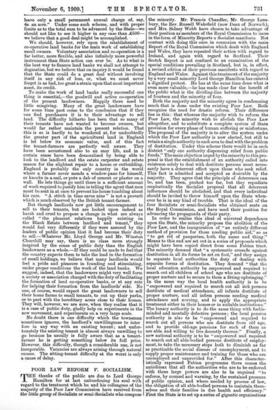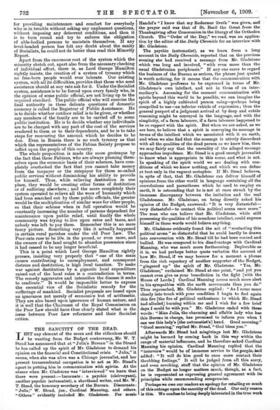POOR LAW REFORM V. SOCIALISM.
THE thanks of the public are due to Lord George-. Hamilton for ' at last unburdening his soul with regard to the treatment which he and his colleagues of the majority of the Poor Law Commission have received- from the little group of Socialiftts. or semi-Socialists who compose the minority. Mr. Francis Chandler, Mr. George Lana- bury, the Rev. Russell Wakefield (now Dean of Norwich), and Mrs. Sidney Webb have chosen to take advantage of their position as members of the Royal Commission to issue in the form of Minority Reports a Socialist manifesto. Not content with doing this once in connexion with the main Report of the Royal Commission which dealt with England and Wales, they have repeated their action with regard to Ireland, and again with regard to Scotland. Their Scotch Report is not confined to an examination of the special conditions prevailing in Scotland, but is, in effect, a revised edition of their previous manifesto with regard to England and Wales. Against this treatmont of the majority by a very small minority Lord George Hamilton has entered a dignified protest. He has at the same time done what is even more valuable,—he has made clear for the benefit of the public what is the dividing-line between the majority of fourteen and the minority of four. Both the majority and the minority agree in condemning much that is done under the existing Poor Law. Both recognise the need for drastic reform. Their difference lies in this : that whereas the majority wish to reform the Poor Law, the minority wish to abolish the Poor Law altogether, and to substitute a complete system of State provision for every phase of human suffering or misfortune. The proposal of the majority is to alter the system under which the Poor Law authority is now elected, but still to retain a single authority in each area to deal with the problem of destitution. -Under this scheme there would be in each district "only one authority dispensing relief from public funds." The main objection urged by the minority to this.pro- posal is that the establishment of an authority called into existence solely to deal with destitute persons must neces- sarily have a deterrent effect upon those who seek relief. This fact is admitted and accepted as desirable by the majority. They agree that the principle of deterrence can be, and has been, pushed too far, but they repudiate emphatically the Socialist proposal that all deterrent influences should be abolished, and that every individual should be invited to throw himself upon the State when- ever he is in any kind of trouble. That is the ideal of the four Socialists or semi-Socialists who obtained seats on the Royal Commission, and have used their position for advancing the propaganda of their party.
In order to realise this ideal of universal dependence upon the State, the minority propose the abolition of the Poor Law, and the inauguration of "an entirely different method of provision for those needing public aid," so as "to get tad of pauperism, both the name and thing." Means to this end are set out in a series of proposals which might have been copied direct from some Fabian tract. The minority demand that "a systematic crusade against destitution in all its forms be set on foot," and they assign to separate local authorities the duty of dealing with separate forms of destitution. They demand "that the local education authority be empowered and required to search out all children of school age who are destitute of proper nurture and to secure to them a fitting upbringing." In the same way the local health authority is to be "empowered and required to search out all sick persona destitute of medical attendance, all infants destitute of proper nurture, and all infirm persons needing medical attendance and nursing, and to apply the appropriate treatment either in their homes or in suitable institutions." The lunacy authority is to do the same thing with feeble- minded and mentally defective persons ; the local pension authority is also to be "empowered and required to search out all persons who are destitute from old age, and to provide old-age pensions for such of them as are able and willing to live decently thereon." Finally, a new national authority is to be "empowered and required to search out all able-bodied persons destitute of employ- ment, to take the necessary steps both to diminish as far as practicable the social disease of unemployment, and to supply proper maintenance and training for those who are unemployed and unprovided for." After this character- istically expressed Fabian programme there comes the anticlimax that all the authorities who are to be endowed with these large powers are also to be required "to enforce, by counsel and warning, by the sustained pressure of public opinion, and where needed by process of law, the obligation of all able-bodied persons to maintain them- selves and . their families in due health and efficiency." First the State is to set up a series of gigantic organisations for providing maintenance • and comfort for -everybody who is in trouble without asking any unpleasant questions, without imposing any deterrent conditions, and then it is to turn round and try to enforce the obligation of able-bodied persons to maintain themselves. If any level-headed person has felt any doubt about the sanity of Socialists, he could not do better than read this Minority Report. Apart from the enormous cost of the system which the minority sketch out, apart also from the necessary checking of individual effort, there is, as Lord George Hamilton rightly insists, the creation of a system of tyranny which no free-born people would ever tolerate. Our existing system, with all its difficulties, provides that those who need assistance should at any rate ask for it. -Under the Socialist system, assistance is to be forced upon every family who, in the opinion of some public official, are not living up to the required standard. The public official who will exercise the final authority in these delicate questions of domestic economy is called the Registrar of Public Assistance. He is to decide whether outdoor relief is to be given, or whether any members of the family are to be carried off to some public institution. He is to decide whether any individuals are to be charged with any part of the cost of the services rendered to them or to their dependents, and he is to take steps for recovering the amount which he decides to be due. Even in Russia there is no such tyranny as that which the representatives of the Fabian Society propose to inflict upon the people of this country. The whole proposition is made the more grotesque by the fact that these Fabians, who are always pluming them- selves upon the economic basis of their schemes, have com- pletely overlooked the fact that you cannot take money from the taxpayer or the ratepayer for these so-called public services without diminishing his ability to provide for himself. Thus, while relieving destitution in one place, they would be creating other forms of destitution or of suffering elsewhere ; and the more completely their system operated to relieve all the woes of humanity which had been searched out by these public officials, the greater would be the multiplication of similar woes for other people, so that their scheme when in full operation would be constantly increasing the number of persons dependent for maintenance upon public relief, until finally the whole community was trying to live upon rates and taxes, and nobody was left to pay them. Remember this is no mere fancy picture. Something very like it actually happened in certain rural parishes under the old Poor Law. The Poor-rate rose to be 20s. in the pound, or even more, and the owners of the land sought to abandon possession since it had ceased to be any longer beneficial. This is a point which Lord George Hamilton rightly presses, insisting very properly that "one of the main causes contributing to unemployment, and consequent distress and destitution, is high local taxation. To make war against destitution by a gigantic local expenditure raised out of the local rates is a contradiction in terms. The remedy aggravates and intensifies the disease it seeks to eradicate. It would be impossible better to express the essential vice of the Socialistic remedy for the sufferings of mankind. Socialist proposals are based upon an ignorance not merely of economics but of arithmetic. They are also based upon ignorance of human nature, and it is well that the Chairman of the Royal Commission on the Poor Law should have thus clearly stated what is the issue between Poor Law reformers and their Socialist critics.































































 Previous page
Previous page